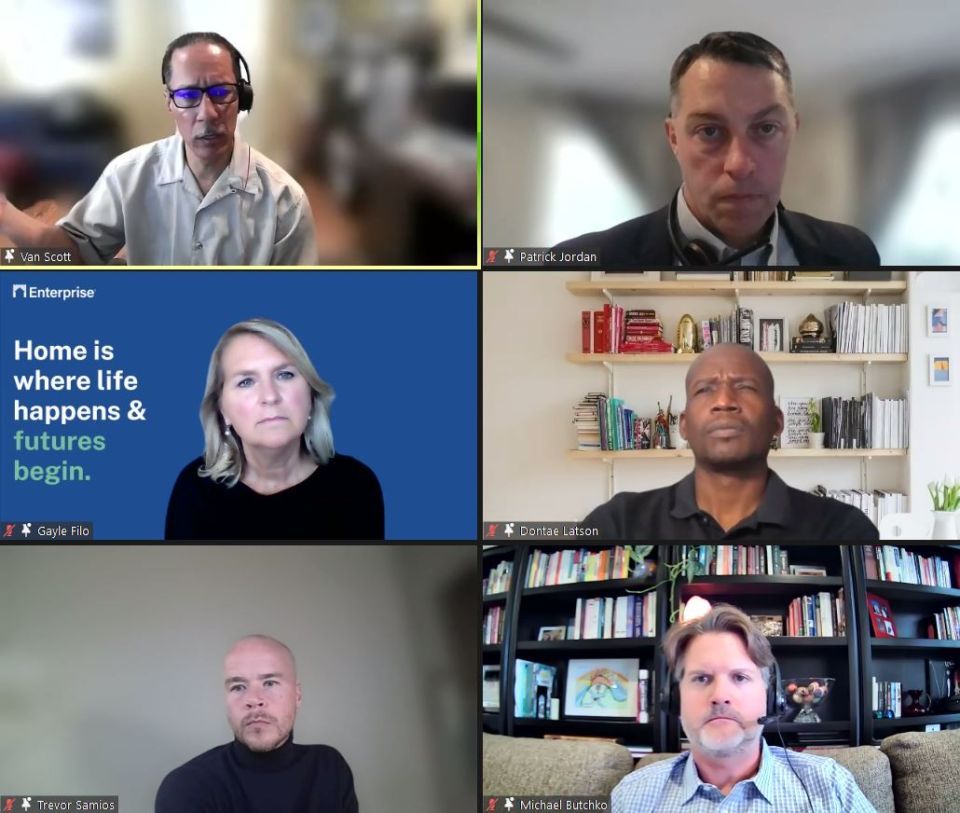At this point in the pandemic, there are more than 6 million renters at risk of eviction nationally.
BIPOC renters, and Black women in particular, face the heaviest burdens due to systemic racism and historic disparities. Evictions have negative consequences for everyone – renters, landlords and communities.
On top of the trauma eviction causes for families who are at risk of experiencing homelessness, eviction doesn’t make economic sense: it is ultimately more cost-effective for people to remain in their homes.
Housing providers – landlords, property owners – have both a front row seat and a vested interest in supporting the housing stability of their renters. At the same time, housing providers face financial strain and uncertainty.
They are working to support tenants experiencing job losses and health crises, protect their frontline staff from Covid-19, and maintain properties despite increased costs and decreased income.
This summer, we launched a four-part eviction prevention webinar series to address the housing stability of renter households as the nation works toward an equitable recovery.
Supported by JPMorgan Chase & Company, the series is intended to provide critical information, tools and best practices to a wide range of partners – including property owners, tenant advocates and policy makers.
At our September 28 webinar, we hosted a landlord roundtable to discuss the challenges they and their renters confront and the innovative ways they have found to support their residents and protect the nation’s valuable affordable housing stock despite the financial strain caused by the pandemic.
Speakers included:
- Michael Butchko, Vice President of& Business Intelligence, NeighborWorks
- Gayle Filo, President, Enterprise Residential
- Patrick Jordan, Vice President of Integration, Enterprise Community Partners
- Dontae Latson, Executive Director, Rocky Mountain Communities
- Trevor Samios, Senior Vice President of Connected Communities, WinnCompanies
- Van Scott, Director of Development, Southern California/Jordan Downs, BRIDGE Housing; Private Landlord
- Maria Torres-Springer, Vice President for US Programs, Ford Foundation
- Jacqueline Waggoner, President, Enterprise Community Partners Solutions Division

Opening remarks from Jacqueline Waggoner and Maria Torres-Springer set the tone for the event by emphasizing the interconnected and relationship-based nature that sustains our housing system:
They also underscored the potential to leverage this moment of crisis to create foundational change:
“Local and federal momentum, together with a national spotlight on housing, provides us with a once-in-a-lifetime opportunity to build broad-based support and enact bold solutions to translate emergency programs to more enduring changes to the system to essentially move from crisis to transformation.”
Enterprise’s Patrick Jordan moderated an engaging panel which drove home some important points.
Four Key Takeaways
1. Despite experiencing financial strain, many housing providers have expanded services for their residents.
Housing providers have experienced financial losses due to declines in rental income, weathered staffing and contractor shortages, and supported the safety, physical and mental health needs of their staff.
Yet many have helped their residents with payment plans and access to rental assistance as well as provided more holistic support, including links to emergency food, Covid testing and vaccination sites, Wi-Fi and laptops and job opportunities.
Michael Butchko from NeighborWorks America highlights that his membership network of nonprofit housing providers experienced a collections loss rate about 10 times the rate of pre-pandemic levels.
However, they were able to increase their staffing levels by more than 1,000 people in order to expand services for residents, including helping them access rental assistance and provide food and basic necessities.
Organizations received government and private grant support to bridge the rental loss and expand services and built new partnerships to meet their residents’ needs. Trevor Samios of WinnCompanies also emphasized that investing in services to prevent evictions makes economic sense compared to the cost of eviction.
Each of the housing providers talked about the challenges they have faced, as well as the solutions they have developed to support their residents’ stability and the wellbeing of their staff.
For example, Gayle Filo with Enterprise Community Development talked about the food pantries they have set up, partnerships with Walgreens and Giant pharmacies to offer Covid vaccines and flu shots, and a job fair they hosted for residents.
2. Building trust with residents is vital to supporting housing stability, including in the context of accessing Emergency Rental Assistance funds to support both resident stability and owner viability.
All panelists talked about how, through supporting residents with accessing rental assistance funds, they can also help them access other benefits, learn more about what their needs are, and build the foundation for a longer-term relationship between housing providers and residents.
Panelists spoke about how this work has led to internal culture shifts that are leading to working more holistically with residents, which also supports their business’ bottom line.
Dante Latson with Rocky Mountain Communities shared how they worked intentionally to build trust with residents to help them access rental assistance, but also to “have deeper and more meaningful relationships that are not rooted in transaction, but they really are rooted in relationship.”
Trust building often starts with empathy and understanding, as Filo noted. “We understand that sometimes rent is not paid because our residents have to choose between food or medicine and rent.”
And trust is built through action. For example, Samios highlighted his organization’s deep work to support residents with a “combination of upstream early and consistent interventions that featured education, two-way communication and hands on assistance.”
3. Small owners in particular have experienced economic hardship in the wake of Covid with more limited resources and access to information.
This dynamic puts small rental properties – which make up the majority of the country’s affordable housing – at risk.
Van Scott, a housing director with Bridge as well as a private landlord of an 8-apartment building in Los Angeles, highlighted the deep, personal relationships individual landlords can have with their tenants: In the wake of Covid-19, he went from “not only being the landlord but also kind of a social worker, health care advocate and a referral agent for jobs” for his tenants.
Van was able to access resources to essentially bring all of his tenants’ rent arrears current through Enterprise’s Local Rental Owners Collaborative (LROC) program, which provides grant funds to address rental arrears along with hands-on support for small independent landlords in South Los Angeles.
4. These emergency response efforts have the potential to lead to sustained change.
The panelists discussed changes they’re supporting both in their own internal culture and in the relationship with their residents that could lead to an eviction prevention-focused approach to property management.
They highlighted the business case for investing in eviction prevention as well as the mandate from a mission-perspective to help their renters become stable and thrive.

More About This Webinar Series
Our first panel in July, Eviction Prevention as a Preservation Strategy, examined the connection between housing stability and eviction prevention as strategies for the long-term preservation of the affordable housing stock.
Our panel on How to Harness the Legal System to Prevent Evictions offered strategies to prevent evictions through, and in partnership, with the judicial system.
Please be sure to subscribe to Enterprise’s newsletter for more news and resources on eviction prevention.
